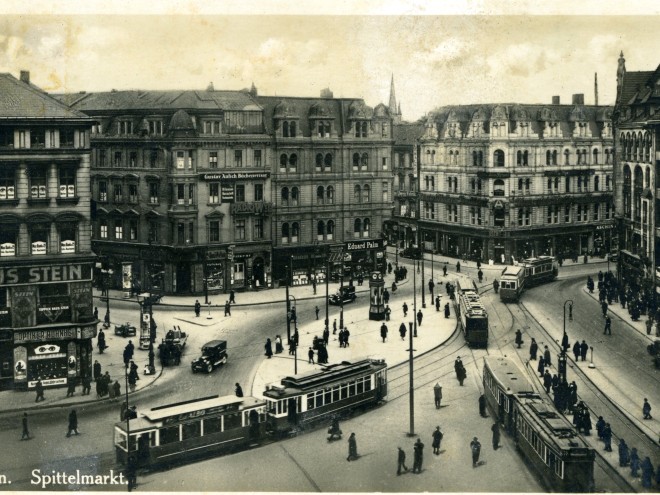The publication of Ulrich Alexander Boschwitz’s harrowing novel, The Passenger, with a new translation from the original German by Philip Boehm, is a major literary event. Written in the weeks following Kristallnacht, when Boschwitz was just twenty-three, The Passenger offers an intimate portrait of Jewish life in prewar Nazi Germany at the onset of dehumanization, before the yellow star was imposed. What remains unsettling is how Boschwitz renders the mentality of Germany’s deeply assimilated Jews, who felt more German than Jewish, but ultimately understood the Nazis’ plans and sought to escape a horrific fate.
Boschwitz filters this intrapsychic drama through the figure of Otto Silbermann, the representative of German Jewish consciousness in The Passenger. Middle-aged, a veteran of World War I, a wealthy businessman, and married to a non-Jew, Silberman has an “Aryan” appearance that enables him to pass as “German.” Yet as the novel opens Silbermann is beginning to sense that his seemingly stable world is turning upside down. Talking with his business partner Becker, Silbermann feels a palpable shift in the atmosphere. Becker makes a false show of empathy, masking antisemitic profiling, regarding Silbermann’s behavior as a “Jew”: “‘If you were a Jew like other Jews,’” Becker remarks, “‘a real Jew, in other words, then you might have kept me on as general manager, but you never would have made me your partner!’” An even nastier observation immediately follows from a waiter, who, after noting that “‘Silbermann had none of the features that marked him as a Jew’” tells him: “‘The best would be … if Jews had to wear yellow bands on their arms. Then at least there wouldn’t be any confusion.’”
Shocked by the waiter’s nationalist desire for racial clarity — an foreshadowing of the regime’s murderous dream of racial purity — Silbermann feels an assault on his humanity. “They have declared war on me, on me personally,” he reflects; “and right now I’m completely on my own — in enemy territory.” Displaced in his own country, Silbermann begins to fathom the dangerous situation, even for non-identifying Jews like himself. He returns to his apartment, looking for his wife, only to find the “large front-hall mirror had been shattered” — his own personal Kristallnacht. Angry and disillusioned, Silbermann contemplates his new, unwanted condition. Unmoored, about to enter a surreal landscape made famous by the acid ironies of Kafka: “And the earth really is shaking,” he reflects, “but only under us.”
The Passenger charts Silbermann’s increasingly futile attempts to escape the boundaries imposed on Jewish movement in his now alien, and alienating, homeland. Reminiscent of Art Spiegelman’s depiction of his father Vladek in Maus, Boschwitz’s Silbermann is in constant motion, crisscrossing Germany with a heavy suitcase and a briefcase stuffed with money, arriving and departing from train station to station in search of … somewhere to rest his persecuted soul. “I simply have to run, run, run” he tells himself. Eventually he recognizes the futility of his efforts — that there is no exit, only immobility: “Now I’m not really traveling, I’m merely moving.” Like Vladek after the War pedaling for his life on a stationary bicycle, Silbermann, despite his constant running, remains in place, trapped in a Germany obsessed with its Jewish citizens, bent on degradation and, eventually, mass murder.
Reading The Passenger, we follow Silbermann on a journey into darkness and, ultimately, madness. As he rides the iron tracks of Germany to nowhere, Silbermann meets other fellow travelers. In one particularly moving exchange, he encounters Lilienfeld, a Jew who voices a profoundly chilling insight still unavailable to Silbermann. “’No one wants to have anything more to do with you,’” Lilienfeld reflects. “’And now? Now you’re just air, and bad air at that!’” Riding the trains, Lilienfeld envisions, uncannily, the looming smokestacks of Auschwitz.
In his preface, André Aciman speaks of the “flawlessly penetrating” power of The Passenger. Boschwitz’s achievement is even more remarkable in light of his biography. Boschwitz, who never identified as a Jew, was in transit his entire life: he, his mother, and sister lived in Sweden, France, Brussels, and England. Deemed an alien in England during the war, Boschwitz was deported to an internment camp in Australia. He died on October 29, 1942, along with 362 other displaced people on the ship the MV Abosso, which was torpedoed by a Nazi U‑boat. Boschwitz was just twenty-seven. Boschwitz’s own story and devastating novel speak to the present — they are uncanny prophecies of our own time marked by the degradation of humanity in flight, searching for a place to call home.
Donald Weber writes about Jewish American literature and popular culture. He divides his time between Brooklyn and Mohegan Lake, NY.





